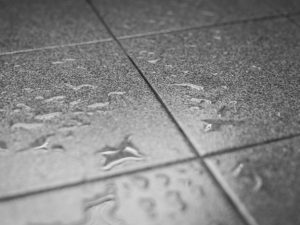All stone is porous, some more than others. For most stone— especially very porous stones like hone-finished limestone or certain granites—sealing is highly recommended.
The application of an impregnating sealer to highly-polished marble and travertine, or polished high-density granites, may not be necessary—but when in doubt, consider this: it doesn’t hurt to have it sealed. If it turns out that sealing the stone does, in fact, prevent some staining, you’ve saved yourself the cost of a stain removal service.
What does an impregnating sealer do?
Contrary to what your perception may be when you hear the word sealer, impregnating sealers are below-surface products that will not alter in any way, shape or form the original finish produced by the factory or offer protection from etching. They will only go inside the stone by being absorbed by it (assuming that the stone is porous enough to allow this to happen) and will clog its pores, thus reducing its natural absorbency rate. This will help prevent possible accidental spills of staining agents from being absorbed by the stone.

